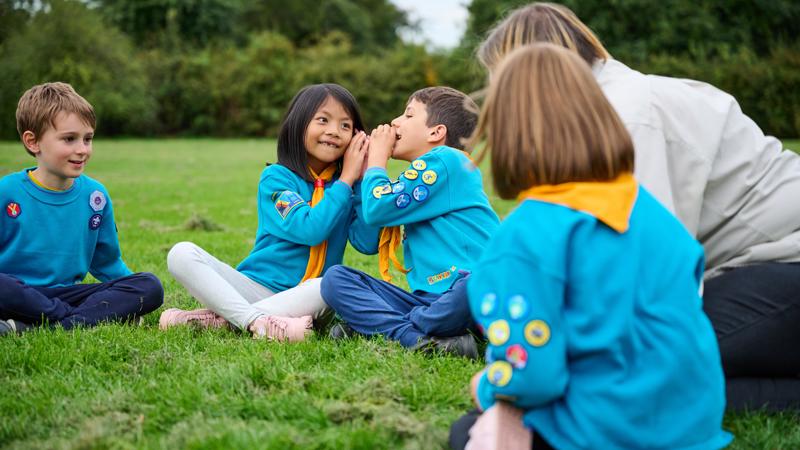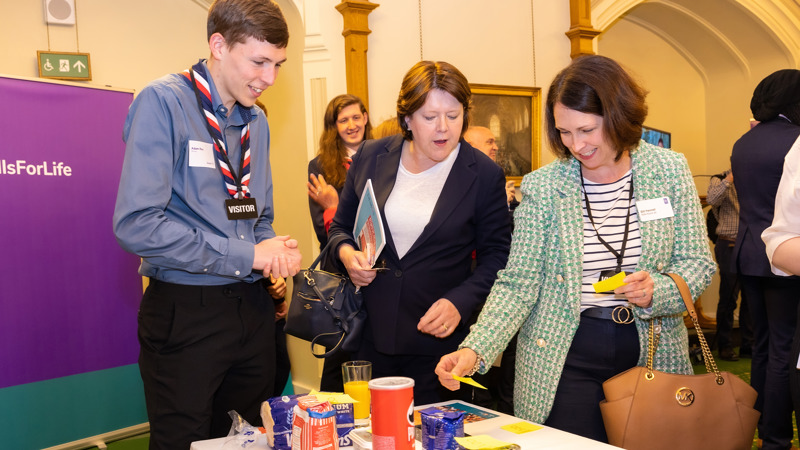How to work with local elected officials
Find out how to work with local councillors to promote Scouts.
Local councillors may not have the same public profile and prominence as members of parliament, but they can wield significant influence on the decisions made in their local area. Scouts is a community organisation, and supporting Scouts is a way for local councillors to support communities and young people in their area.
How to communicate effectively
Councillors undertake their roles on a part-time basis, meaning they’re often pressured for time. For organisations like Scouts, communicating effectively with councillors is very important. This should start with helping councillors to understand what Scouts is, in simple, understandable terms. Here are some examples:
- Scouts are do-ers and give-it-a-go-ers. Yes, we go camping, hiking, swimming, abseiling, cycling and canoeing. But, we also get to hang out with our friends every week – having fun, playing games, working in a team and taking on new challenges.
- Every week we give almost half a million 4-25 year olds the skills they need for school, college, university, the job interview, the important speech, the tricky challenge and the big dreams: the skills they need for life.
- Everyone’s welcome here. All genders, races and backgrounds. Regardless of your young person’s physical ability – there’s a Scout adventure out there waiting for them.
Effective communication between charities, like Scouts, and local councillors is the key to unlocking the potential of this important relationship.
Why should Scouts work with local elected officials?
Every year, central and local government spends around £15 billion on funding for charities. As a major partner and source of funding, councillors can provide great ‘on the ground’ support to charities. Some councillors have direct access to funds, while others can signpost grant options or support funding applications.
Local councillors tend to have a large network, so they can arrange conversations and relationships. If you’re looking for somewhere to meet, a councillor may have access to venues or know people that do. They can speak on your behalf with council officers or other community groups. Councillors can also visit Scout Groups, helping with events such as UK Parliament week.
Councillors may also be able to help with communications work, supporting your Scout Group with a quote or post on social media. They can use their voice to encourage people to volunteer and support Scouts.
Remember to follow Scouts' rules for political campaigning.
How do I find my local councillor?
Councillors understand that local government structures aren’t always easy for charities to understand or navigate. The key to working successfully with councillors is finding the right person to speak to.
There are two main reasons why a local councillor might be interested in Scouts' activities. Firstly, if we operate within the area that the councillor represents. Secondly, if we address a particular issue that the councillor cares about.
You can find out which councillor represents a specific area on WriteToThem. However, uncovering their specific interests can be more challenging. One helpful way to do this is by checking the committees that the councillor is involved in on the council's website.
If you want to engage with a councillor who is focused on children's services and education, your best bet is likely to reach out to a cabinet member or committee chair responsible for these areas. They're more likely to be receptive and able to provide relevant insights or support.
Inviting councillors to Scouts events
Research by the Charity Commission found that three-quarters of councillors see one-to-one meetings and attending events, as the most important methods of contact with charities and community groups. This means we can gain a lot by inviting local councillors to our events. Not only can we provide councillors with insights into the work we do, but most councillors will also share posts about our events and fundraisers on their social networks, driving awareness with a wider audience.
Councillors also use events as an opportunity to meet local residents, so there can be a benefit for both sides. Try to think of something interesting for the councillor to do – more than cutting a ribbon to open an event. This way, you’ll get more exciting photos and give the councillor a proper insight into what Scouts is all about.
Engaging with councillors
When talking to a councillor, always be really clear what you’re asking for.
- Are you fundraising and looking for access to council funds?
- Are you looking for an endorsement of a grant application?
- Do you need access to a venue?
- Are you asking the councillor to share information for you? Is this via networking, in the traditional media, or on social media?
- Are you looking for volunteers? Do you want the councillor to link you up with suitable people and encourage them to volunteer?
What actions can councillors take?
A member’s enquiry is an enquiry a councillor can make to officers to get information on your behalf or to make a request of the council. The council is duty bound to answer in a set period of time, usually ten working days.
A council motion is a proposal made during a council meeting. It’s a formal way of suggesting an action or decision the council should take. A motion can be proposed by any member of the council and must be seconded by another member before it can be discussed. Once a motion has been proposed and seconded, it’s open for debate and discussion, which means it can raise the profile of an issue locally. The motion is voted on by the councillors, and if passed, it becomes a resolution and a commitment from the authority.
A councillor can raise a formal question to the council, this results in a formally minuted written answer.
Scout Groups can contribute to consultations. Councillors value charities for a wide range of things, one of the most important is the evidence and insights charities can provide, which helps councillors make better decisions and run more powerful campaigns. Look for consultations with a clear link to Scouts, such as protecting open space or increasing funding for youth groups. You’ll be able to find these on your council’s website. Taking part also shows that Scouts is an important voice in the community.
Councillors may have a strong social media presence and voice in your community, they might even have a column in the local paper. You might consider asking them to use these channels in order to raise the profile of your Scout Group.
Templates and examples
Motion in the name of Cllr ...,
Across ... amazing volunteers are running uniformed youth groups that teach young people skills for life and provide them with an opportunity to have adventures. Last month ... Scout Group opened a new .... This is Scouts for ... to ... year-olds, particularly targeting ... wards to make sure all children have access to the same opportunities. Non-formal education transforms young people’s lives and directly supports their achievements at school. This council thanks our borough’s volunteers and commits to supporting uniformed youth organisations across the borough, so that they can reach the young people who need it most.
Motion in the name of Cllr ...,
I urge this council to launch a volunteer recruitment campaign that supports voluntary groups in our community. Recently, I visited ... Scout Group who, every week, provide adventurous activities and skills for life to X young people. I really enjoyed joining in and trying .... However, there are another X young people waiting to join across .... To clear this waiting list, Scouts need to recruit X adults.
By running a campaign, and throwing our support behind this amazing charity, we can help hundreds more young people in ... gain vital skills for life.
Motion in the name of Cllr ...,
In our borough, volunteers provide amazing opportunities for young people to learn skills and have adventures in Scout Groups. Currently, there are X young people on waiting lists. Finding volunteers isn’t the only challenge to reducing these lists, another is a lack of affordable places to hold meetings.
This council commits to providing meeting places, at discounted rates, for voluntary groups across the borough.
Question from Cllr ..., to Cllr ... – Cabinet Member for ...,
What is this council doing to support youth organisations in ...? Every week X of our young people are learning skills for life, through Scouts. We should do all we can to help organisations, such as the Scouts, give young people in our area the best start to life.
Question from Cllr ..., to Cllr ... – Cabinet Member for ...,
Will this council launch a volunteer recruitment campaign, to support voluntary groups in our community. Recently I visited ... Scout Group who, every week, provide adventurous activities and skills for life to X young people. I really enjoyed joining in and trying .... However, there are another X young people waiting to join across .... To clear this waiting list, Scouts need to recruit X adults.
Question from Cllr ..., to Cllr ... – Cabinet Member for ...,
In our borough, volunteers provide amazing opportunities for young people to learn skills and have adventures in Scout Groups. Currently, there are X young people on waiting lists. Finding volunteers isn’t the only challenge to reducing waiting lists, another is a lack of affordable places to hold meetings. Will this council commit to providing meeting places, at discounted rates, for voluntary groups across the borough?

Find out how Scouts can campaign for change and what rules we have to follow.

Learn to use member communication to build a network of advocates and supporters.

Get top tips and guidance on how to use social media to engage with people outside of Scouts.

Find out who your local councillors are and how to contact them.